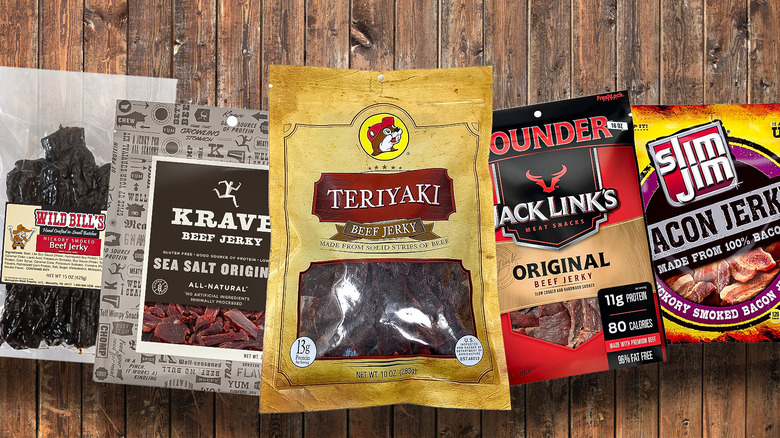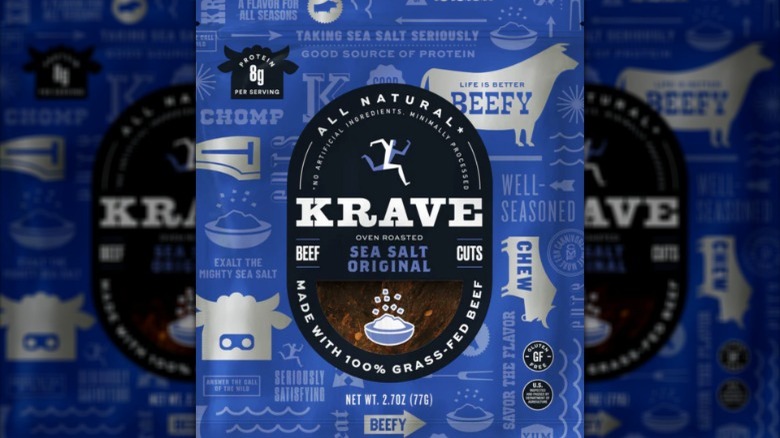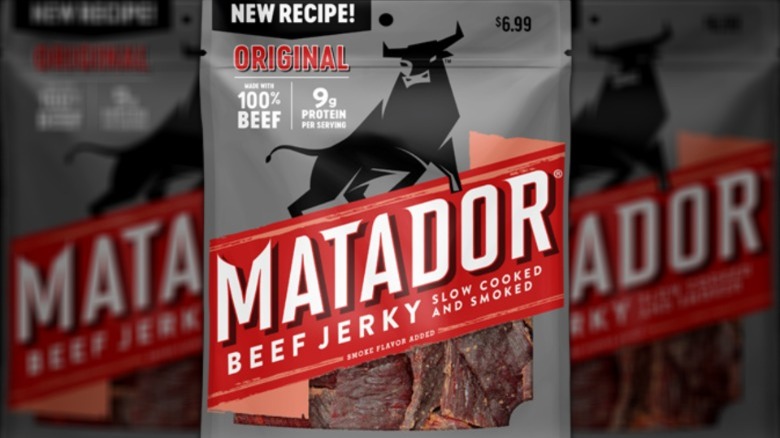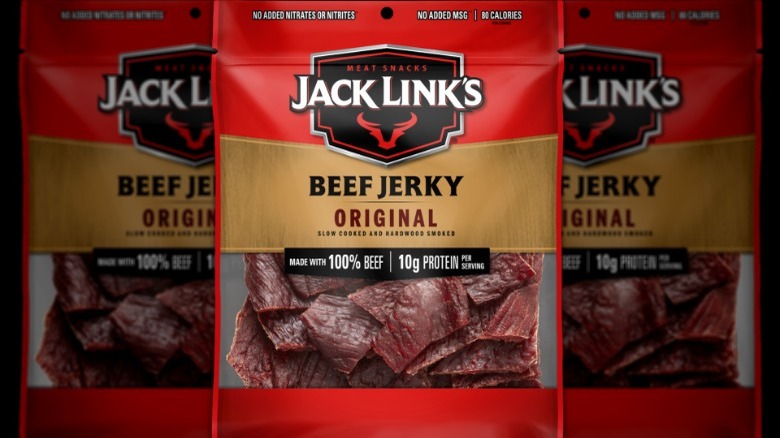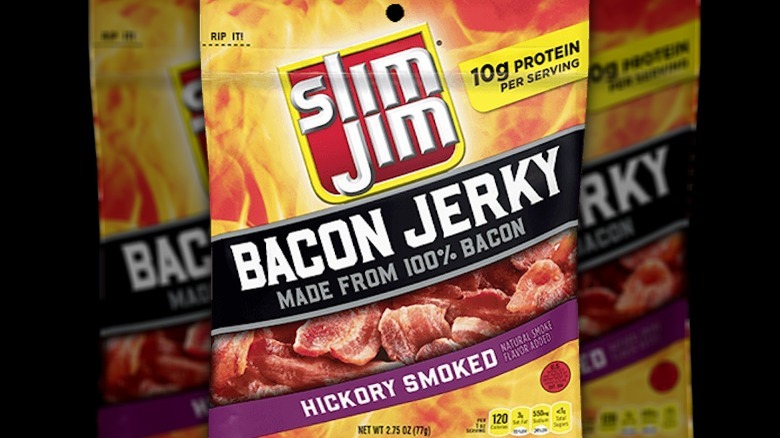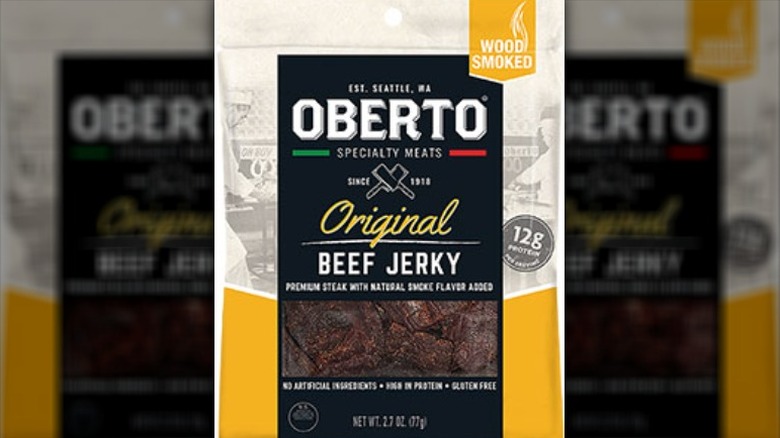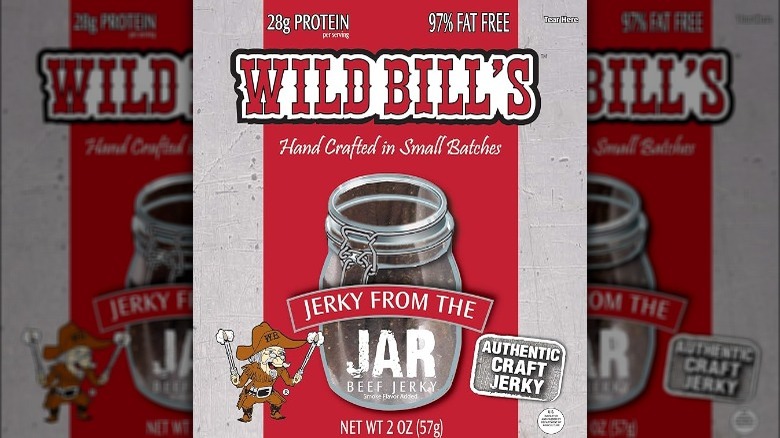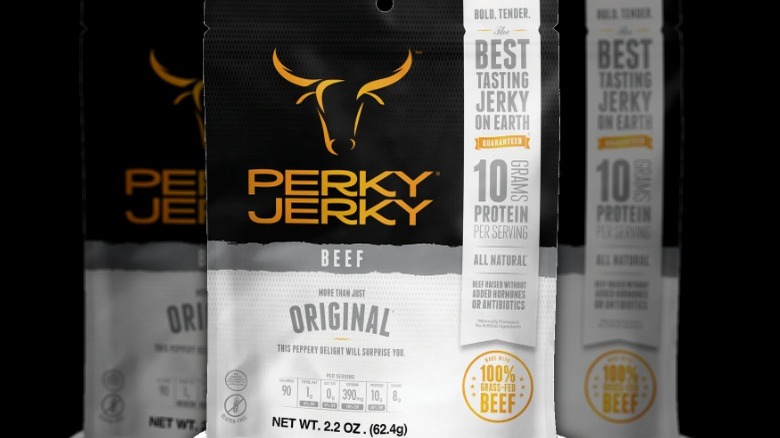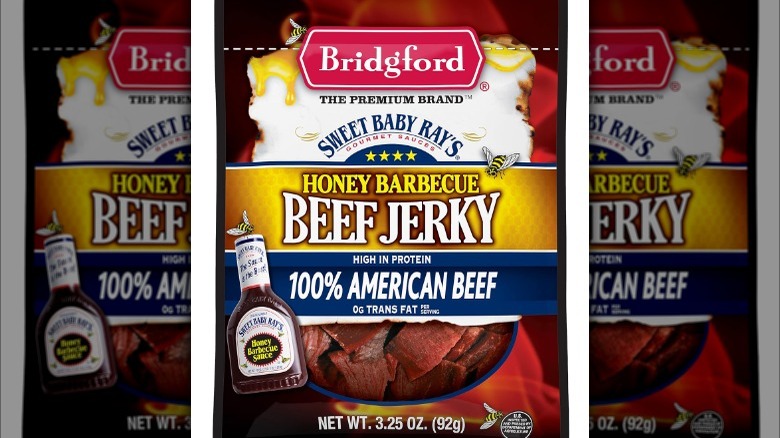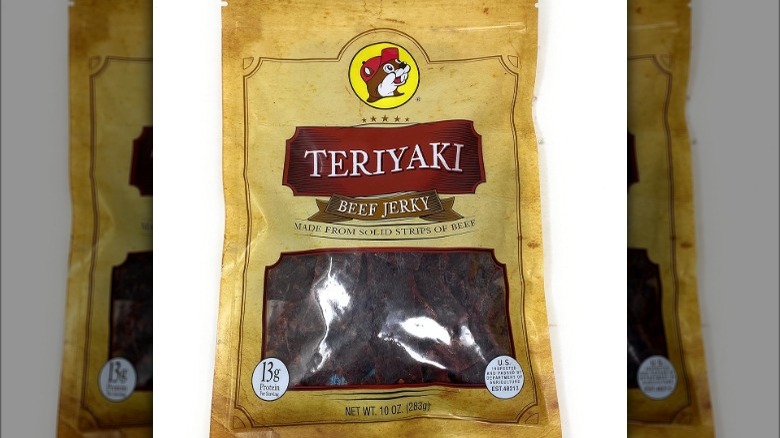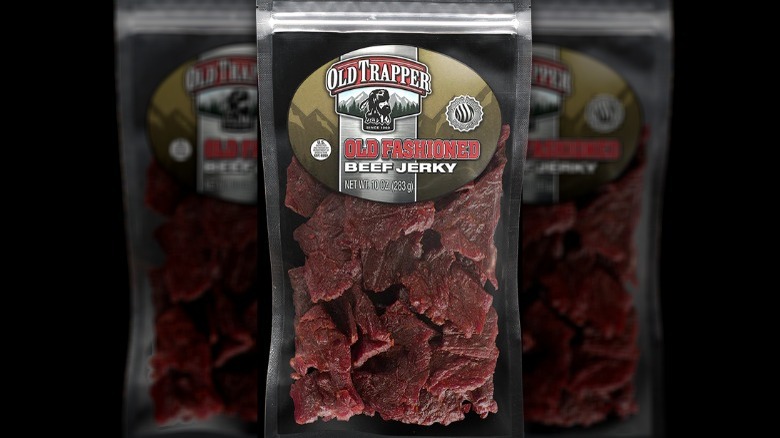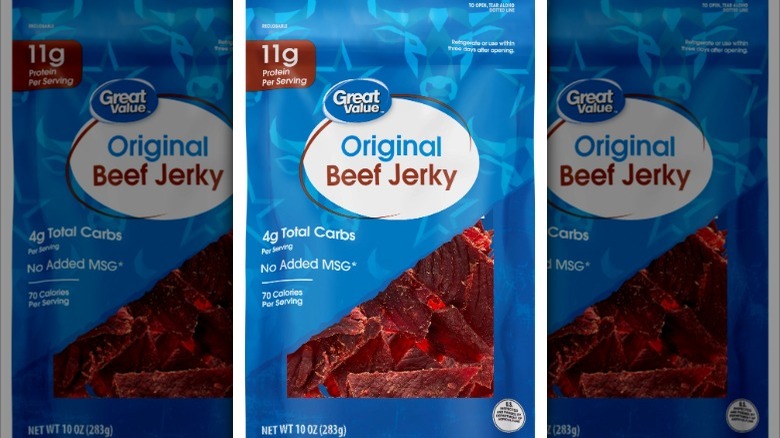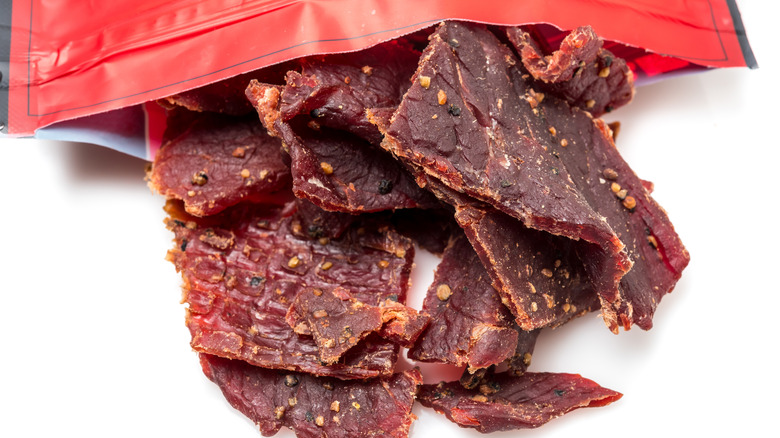The 11 Unhealthiest Beef Jerky You Can Buy
We may receive a commission on purchases made from links.
Beef jerky is delicious, protein-rich, and easy to eat on the go, which is why it's such an ideal snack. Made from dried and cured beef with seasoning for flavor, it would seem like it could be pretty healthy too. But the truth about beef jerky is that while some products are relatively healthy, plenty more are inundated with excessive salt and chemical additives, compromising their nutritional value altogether. Even some of the options that appear healthy contain elements you may want to enjoy in moderation only.
To steer you away from accidentally choosing a meat snack with less-than-ideal nutritional value, we've done a little digging to put together this list of some of the unhealthiest beef jerky options out there. Our evaluation is based on a typical 1-ounce serving of beef jerky and how it stacks up against the FDA's recommended daily consumption guidelines for components like sodium, carbs, and fat.
We also inspected the ingredient lists on many beef jerky packages for additives, most of which are probably best left out of your regular diet. One that pops up again and again is sodium nitrite. While sodium nitrite is a popular additive in cured meat products, many companies have phased it out because of its link to diabetes and heart disease. The result of our beef jerky analysis is a mix of well-known and lesser-known brands that just don't cut it when health standards are part of the equation.
1. Krave Sea Salt Original Beef Jerky
Many people reach for beef jerky as a top snack option because it is presumably low in carbs. Unfortunately, that's not the case for Krave Sea Salt Original's Beef Jerky. Each 1-ounce serving contains a whopping 9 grams of carbs and it's all sugar. To put that in perspective, a Krispy Kreme glazed donut weighs around 2.2 ounces and has 10 grams of sugar. This means Krave Sea Salt Original Beef Jerky contains much more sugar per ounce than a Krispy Kreme donut. Yikes.
Looking at a package of Krave Sea Salt Original Beef Jerky, there aren't many clues that it would be so unhealthy. The label boasts about its use of grass-fed beef and no artificial ingredients, which are definitely details to look for when you want a healthy beef jerky snack. It also has much less sodium than many of the other brands out there. All the same, the issue with it boils down to the unfortunately high sugar content.
2. Matador Original Beef Jerky
Generally, sodium values in beef jerky are fairly high, but Matador Original Beef Jerky takes the term excessive salt to a new level. It contains 710 milligrams of sodium in one single serving. For a daily diet of 2,000 calories, that's 30% of your sodium intake in just 1 ounce. If you are going to indulge in Matador's Beef Jerky once in a while, watch how much you eat. If you double or triple up on the 1-ounce serving, you're already consuming most or all of the recommended daily sodium intake in little more than a few bites.
Looking at the ingredients list on the package doesn't help the nutritional concerns either. It includes more than a couple of ingredients that aren't particularly desirable, like MSG, maltodextrin, and sodium nitrite. The Matador's Original Beef Jerky ingredients label also mentions "smoke flavor" as well as just "flavors." Nondescript flavor ingredients are not great to see on any package because it's hard to know what they really are. All in all, your body will certainly thank you for choosing a beef jerky with far less sodium and questionable ingredients.
3. Jack Link's Original Beef Jerky
Jack Link's is practically a household name in the world of beef jerky, with global annual sales close to a billion dollars. That's a lot of Jack Link's Beef Jerky people are eating. Unfortunately, snacking on this very popular brand of beef jerky is not the healthiest choice, no matter what your neighbor may say. Every serving contains 520 milligrams of sodium, which is almost a quarter of the total sodium the FDA recommends per day in a 2,000-calorie diet, all in a single ounce.
The salt content is not the only aspect of Jack Link's Original Beef Jerky that makes it unhealthy either. Despite the brag right on the package for being free of harmful nitrites, the list of ingredients shows additives like hydrolyzed corn protein and maltodextrin. While these are not inherently known for causing health problems, overly processed foods raise concerns about the potential long-term effects on the body.
4. Slim Jim Hickory Smoked Bacon Jerky
While Slim Jim Hickory Smoked Bacon Jerky is not a traditional beef recipe, it's sold alongside all the beef jerky options at any gas station or grocery store. Does anyone expect a jerky made from 100% bacon to be healthy? Probably not, and they're not wrong. Normally, beef jerky has a couple of grams of fat per serving, which is true even among many of the less-than-healthy items on this list. A single serving of Slim Jim's Bacon Jerky, however, will hit you with 8 grams of fat (including 3 grams of saturated fat). That's far from ideal, especially if you thought anything labeled jerky was automatically a healthy snack option.
On top of all that fat, this jerky also contains 550 milligrams of sodium per serving. While this is not the highest salt content you'll see among jerky options, it's still far from healthy. Moving on down the label to the list of ingredients, it just gets worse. Slim Jim Hickory Smoked Bacon Jerky contains three kinds of sodium additives, including sodium phosphate and sodium nitrite, both of which can pose health risks. Some research shows that sodium phosphate may cause damage to the body's blood vessels. Knowing all the health data on Slim Jim's Bacon Jerky may make you think twice about eating it from now on.
5. Oberto All-Natural Original Beef Jerky
When it comes to food, all-natural does not necessarily mean all-healthy, and that is unfortunately the case with Oberto's All-Natural Original Beef Jerky. While it is a low-calorie, low-carb, and low-fat snack, it also contains 600 milligrams of sodium per serving. That is notably higher than many other more health-conscious beef jerky brands on the market. Oberto's changed its jerky recipe to all-natural in 2011, and it's possible the company tried to make up for the flavor it lost when it went natural by adding a lot more salt.
Besides the heavy salt in Oberto's All-Natural Original Beef Jerky, nothing else on its nutrition label stands out as being particularly unhealthy. The ingredient list is almost completely free of anything chemical, save for the final item, which is smoke flavoring. Still, while Oberto's doesn't land at rock-bottom with its nutritional value, consuming 25% of the recommended daily sodium in a single 1-ounce serving of beef jerky isn't a great look.
6. Wild Bill's Hickory Smoked Beef Jerky
Wild Bill's Hickory Smoked Beef Jerky is wildly popular for its exceptional flavor and texture. This makes sense considering the jerky is hand-crafted, specially seasoned, and made in a real smokehouse using real wood. However, its deliciousness says little about its nutritional value. With 600 milligrams of sodium per serving, it makes it harder to justify choosing Wild Bill's beef jerky for a snack.
It's not just the salt that lands this product far from being the healthiest choice of beef jerky on the market. There's also the laundry list of additives to address, like hydrolyzed corn protein, maltodextrin, and smoke flavor. Considering that Wild Bill's frequently ranks as one of the best beef jerky options on the shelves, we understand that indulging your taste buds every so often might be hard to avoid. Still, it's probably best to keep it to a minimum because of its troublesome nutritional value.
7. Perky Jerky Original Beef Jerky
Perky Jerky is not completely devoid of nutritional value. The beef in the jerky is completely grass-fed, there's only a single gram of fat per serving, and it contains no additives whatsoever. In fact, there are only six ingredients in Perky Jerky Original Beef Jerky, which are all easy to recognize and pronounce. What's more, it has a meager 390 milligrams of sodium, which is significantly lower than most of the other brands on this list. Still, there's a reason we're including Perky Jerky among the unhealthiest beef jerky options.
Perky Jerky is recognized among jerky connoisseurs for its mouthwatering taste. Just ask this blogger, who raves about it being "The Best Tasting Jerky On Earth." But the delicious flavor has to come from somewhere, and that somewhere is its sugar content. Every ounce of Perky Jerky you eat has a hefty 8 grams of sugar, likely originating from the tasty marinade it boasts about in the product description. Eight grams of sugar per serving is high for beef jerky, especially considering that many other healthier options have a mere 2 grams or less. The takeaway isn't that you should never take a bite of Perky Jerky's beef jerky in your life, just that you might want to watch how much of it you eat because of all that sugar.
8. Sweet Baby Ray's Honey Barbecue Beef Jerky
Most people know the brand Sweet Baby Ray's for its barbecue sauce, but the company also makes several flavors of beef jerky. With a rating of 4.6/5 stars on Amazon, Sweet Baby Ray's Honey Barbecue Beef Jerky is a customer favorite. Yet honey and brown sugar pack in plenty of sweetness, making this beef jerky less than optimal for your health. Each 1-ounce serving comes with 7 unforgiving grams of sugar. We've seen beef jerky with more sugar than this, but it's still up there so you might want to limit how many servings you indulge in.
Worse than the sugar is the never-ending ingredient list, full of chemicals and additives that are never great to see on a label. The worst is sodium nitrite, though it doesn't end there. It also contains MSG, sulfating agents, caramel color, silicon dioxide, modified food starch, and several more. Needless to say, Sweet Baby Ray's Honey Barbecue Beef Jerky is not a snack to reach for if you want any semblance of a clean diet.
9. Buc-ee's Teriyaki Beef Jerky
Buc-ee's is a Texas convenience store chain with its own brand of beef jerky, which has become beloved across the Lonestar State and beyond. Yet don't let the fame of Buc-ee's beef jerky blind you to the disappointing nutrition label on its best-selling teriyaki flavor. What stands out most is the astronomical level of sodium, which tops all the other jerky options on this list. For every serving of Buc-ee's Teriyaki Beef Jerky you eat, you're getting 830 milligrams of sodium. That's 36% of your daily recommended salt in just 1 ounce of snacking, a difficult number to stomach for so little food.
The salt alone is startling enough, but it doesn't get any better as you move on to inspect the long list of ingredients. With additives like MSG, sodium nitrite, sucrose, and modified food starch, it's evident that the priority in Buc-ee's Teriyaki Beef Jerky is not nutritional value. If you're on the hunt for a healthier beef jerky, you might want to explore other options that aren't quite as loaded with sodium and additives. Or maybe you could try a scrumptious homemade teriyaki beef jerky recipe instead.
10. Old Trapper Old Fashioned Beef Jerky
Nearly any gas station in America that sells beef jerky is likely going to have Old Trapper available. The popularity of this jerky stems from its reputation in the industry, with over 50 years of making products that people have never stopped buying. But reputation tends to come from flavor rather than nutrition, and in this case, part of that flavor is surely salt. Old Trapper Old Fashioned Beef Jerky has 600 milligrams of sodium per serving to be exact, which is nothing short of excessive.
Old Trapper's Beef Jerky lands on the unhealthy side of the line for more reasons than just salt. While it doesn't have a particularly long list of ingredients, the presence of troubling additives like hydrolyzed corn protein, sodium nitrite, and the elusive "flavorings" may be concerning for anyone seeking a more natural snack option. The bottom line: Just because it's easy to find Old Trapper Old Fashioned Beef Jerky doesn't mean it's a good idea to buy it.
11. Great Value Beef Jerky
Walmart's version of beef jerky is sold under its brand name Great Value. Most beef jerky tends to be pretty expensive, but Great Value makes it a little more affordable. However, you should be warned: What you're saving in money you may be losing in health. One serving of Great Value Beef Jerky has 550 milligrams of sodium, which is no small quantity. Some of the additives on the ingredient list are also questionable, such as hydrolyzed corn protein and the infamously vague "flavors."
Speaking of flavors, Great Value Beef Jerky generally doesn't score high in customer satisfaction ratings. One reviewer didn't hold back when calling the taste "uninspiring and somewhat bland," like "chewing for the sake of chewing." It seems like an unnecessary waste to potentially jeopardize your health with excessive salt and additives when the flavor leaves so much to be desired. You're best finding another option that not only tastes better but is healthier too.
How we chose the beef jerky on this list
To figure out which beef jerky was the least healthy, we checked the labels on a wide range of options, from well-known brands to small-batch producers. We meticulously scrutinized the nutritional information, comparing factors like sodium content, additives, sugars, and overall ingredient quality against other brands and the FDA's guidelines for daily consumption. This thorough investigation allowed us to discern which beef jerky options stood out as the unhealthiest among the choices available. We always used the standard 1-ounce serving size in our comparisons. Some beef jerky scored low across the board, while others fell short only in certain aspects. Occasionally, an otherwise healthy beef jerky scored so poorly in one area that it was impossible to leave it off the list.
Beef jerky marketing often highlights the high protein and low calorie content, purposefully presenting it as a healthy snack choice while overlooking the things that make it less healthy. For this reason, it was sometimes surprising to find out just how unhealthy certain beef jerky varieties are. We all know cured meats are salty, but some beef jerky brands take their liberties with salt a bit too far. Additionally, some sneak excessive amounts of sugar or unnecessary additives into a supposedly healthy snack, making it necessary for helath-conscious consumers to check the label.
